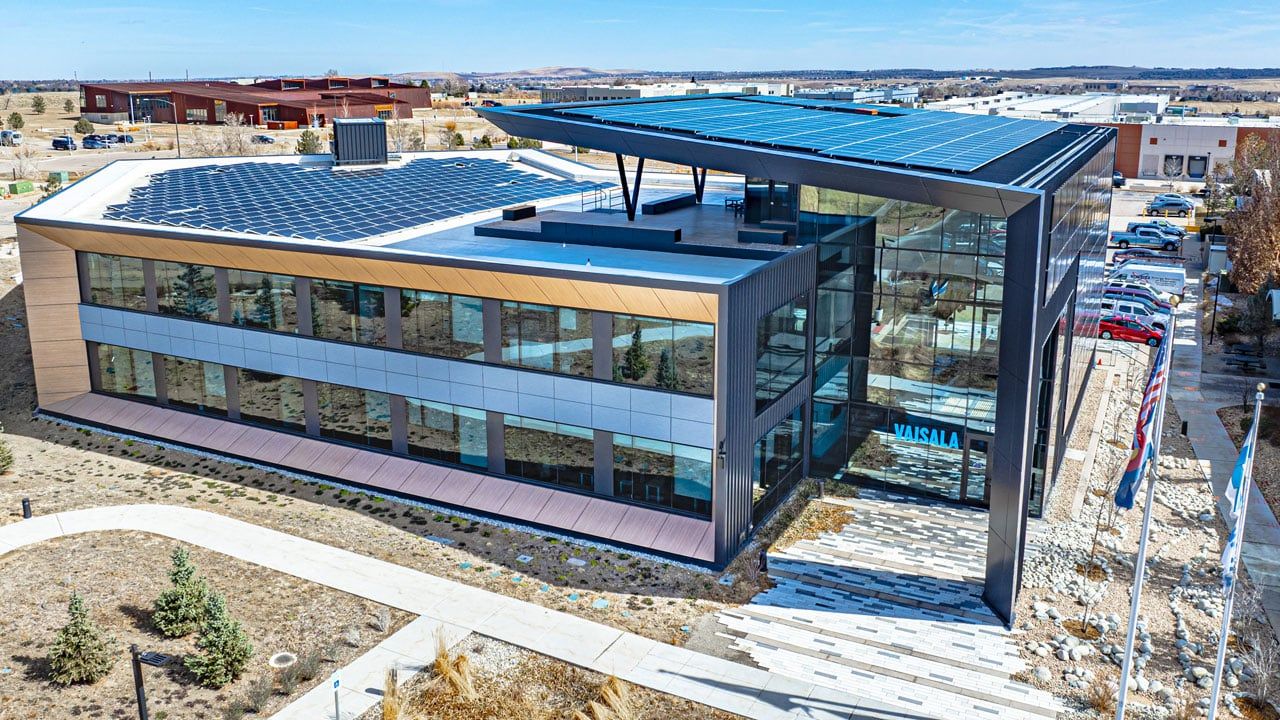Abound panels deemed a hazard
An inspector for the Colorado Department of Public Health and Environment found 2,000 pallets of solar panels “deemed unsellable” in a warehouse in Denver, according to a state report.
Panels also were found in a facility in Longmont; other hazardous waste was found in a Fort Collins facility.
SPONSORED CONTENT
Commercial Solar is a big investment, but not an overwhelming one
Solar offers a significant economic benefit for commercial property owners while also positively impacting the environment and offering a path to compliance for new municipal requirements like Energize Denver. A local, experienced solar installer will help you navigate the complexities of commercial solar to achieve financial success for your project.
The panels contain cadmium, a cancer-causing metal considered hazardous, though officials say there was no immediate public health risk.
“At the time of the inspection these 2,000 pallets of solar panels were deemed unsellable and a viable agreement for reclamation of the solar panels was not evident,” the inspector’s report says. “Therefore, the department views these 2,000 pallets of solar panels as a characteristic hazardous waste for cadmium.”
In all, Abound Solar’s bankruptcy trustee estimated that cleanup would cost $2.2 million. The panels must be disposed of at a facility permitted by the state.
Loveland-based Abound Solar declared Chapter 7 bankruptcy in July. Its executives blamed the company’s failure on competition from the Chinese, but the Business Report revealed last year the company also had serious manufacturing problems with its solar panels. Abound Solar had amassed liabilities of $82 million and had assets of $136.1 million before finally throwing in the towel, according to documents filed in U.S. Bankruptcy Court.
The company’s collapse drew the attention of federal lawmakers because Abound Solar had received a $400 million loan guarantee, of which it drew down $70 million. As a result, taxpayers were expected to be saddled with losses of $40 million to $60 million.
The U.S. Environmental Protection Agency informed the state about the solar panels, and the state inspected Abound Solar’s facilities, said Joe Schieffelin, the Public Health department’s Solid and Hazardous Waste program manager.
In its probe, the state said it found that the Denver warehouse storing the panels did not have a permit to store hazardous waste. The state has asked Abound Solar to dispose of the panels and any other waste that may have contaminated the warehouse.
There’s only one treatment facility in the state, a landfill near Last Chance in eastern Adams County. The panels would likely be treated, mixed in cement and buried, Schieffelin said.
Violating state hazardous waste regulations carries an administrative fine of as much as $15,000 daily and a civil fine of as much as $25,000 per violation per day, according to the state.
However, the state has not fined Abound Solar, and there’s no deadline for the company to perform cleanup and disposal.
“We wanted to give them as much chance as possible to sell the ones that are good, because some of them are good,´ said Schieffelin, noting that other panels don’t work properly.
Schieffelin also explained that the state has not fined Abound Solar because it wants the company to have money available to address the problem.
Adam Singer, an attorney for Abound Solar’s Delaware-based bankruptcy trustee Jeoffrey Burtch, did not respond to requests for comment. But Singer’s response to the state’s investigation shows that Abound Solar representatives have estimated disposal of the 5,225 panels at the Denver warehouse will cost nearly $1.7 million. The trustee disputed that the warehouse contained 2,000 pallets of panels, but rather 1,870 pallets.
The trustee initially contacted Clean Harbors, a Norwell, Mass., hazardous waste disposal company, but “the trustee and Clean Harbors were not able to agree on mutually acceptable terms.” The trustee has since received estimates from PSC in Houston for disposal of the panels.
Disposal of another 1,250 solar panels at a facility in Longmont will cost $395,000, according to the state’s documents. Costs to clean that facility are estimated at more than $52,000.
Cleanup at Abound Solar’s research and development facility at 4557 Denrose Court in Fort Collins will cost at least $21,000, according to an estimate from PSC. Another estimate, from Sunnyvale, Calif. -based Advanced Chemical Transport, came in much higher, putting the cleanup costs at $89,000. The state inspector found cadmium waste at the Fort Collins facility, though no panels were found there.
Schieffelin said he did not know whether any disposal had taken place yet. The trustee still is trying to sell some of the “good panels,” he said.
Any panels that cannot find a buyer would be deemed hazardous waste.
NOTE: An earlier version of this story erroneously said that solar panels were found in a Fort Collins facility. It should have said that hazardous waste was found in Fort Collins.
An inspector for the Colorado Department of Public Health and Environment found 2,000 pallets of solar panels “deemed unsellable” in a warehouse in Denver, according to a state report.
Panels also were found in a facility in Longmont; other hazardous waste was found in a Fort Collins facility.
The panels contain cadmium, a cancer-causing metal considered hazardous, though officials say there was no immediate public health risk.…
THIS ARTICLE IS FOR SUBSCRIBERS ONLY
Continue reading for less than $3 per week!
Get a month of award-winning local business news, trends and insights
Access award-winning content today!

